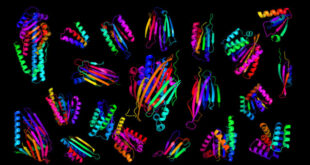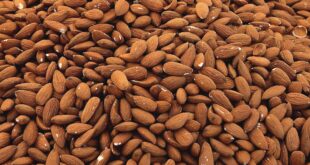Consumption of fermentable fiber can prevent obesity, metabolic syndrome and adverse changes in the intestine by promoting growth of ‘good’ bacteria in the colon, according to a study published in the journal Cell Host Microbe.
Zou et al found the fermentable fiber inulin restored gut health and protected mice against metabolic syndrome induced by a high-fat diet by restoring gut microbiota levels, increasing the production of intestinal epithelial cells and restoring IL-22 expression, which prevented gut microbiota from invading epithelial cells. Image credit: National Institutes of Health, U.S. Department of Health and Human Services.
“We found that manipulating dietary fiber content, particularly by adding fermentable fiber, guards against metabolic syndrome,” said study senior author Professor Andrew Gewirtz, from the Institute for Biomedical Sciences at Georgia State University.
For four weeks, Professor Gewirtz and co-authors fed mice either a grain-based rodent chow, a high-fat diet (high fat and low fiber content with 5% cellulose as a source of fiber) or a high-fat diet supplemented with fiber (either fermentable inulin fiber or insoluble cellulose fiber).
The high-fat diet is linked to an increase in obesity and conditions associated with metabolic syndrome.
The researchers discovered a diet supplemented with inulin reduced weight gain and noticeably reduced obesity induced by a high-fat diet, which was accompanied by a reduction in the size of fat cells.
Dietary enrichment with inulin also markedly lowered cholesterol levels and largely prevented dysglycemia (abnormal blood sugar levels).
The team found insoluble cellulose fiber only modestly reduced obesity and dysglycemia.
Supplementing the high-fat diet with inulin restored gut microbiota. However, inulin didn’t restore the microbiota levels to those of mice fed a chow diet.
A distinct difference in microbiota levels remained between mice fed a high-fat diet versus those fed a chow diet.
Enrichment of high-fat diets with cellulose had a mild effect on microbiota levels.
In addition, the scientists found switching mice from a grain-based chow diet to a high-fat diet resulted in a loss of colon mass, which they believe contributes to low-grade inflammation and metabolic syndrome.
When they switched mice back to a chow diet, the colon mass was fully restored.
“This study revealed the specific mechanism used to restore gut health and suppress obesity and metabolic syndrome is the induction of the protein interleukin-22 (IL-22) expression,” Professor Gewirtz said.
“The results contribute to the understanding of the mechanisms that underlie diet-induced obesity and offer insight into how fermentable fibers might promote better health.”
_____
Jun Zou et al. 2018. Fiber-Mediated Nourishment of Gut Microbiota Protects against Diet-Induced Obesity by Restoring IL-22-Mediated Colonic Health. Cell Host Microbe 23 (1): 41-53; doi: 10.1016/j.chom.2017.11.003
 #Bizwhiznetwork.com Innovation ΛI |Technology News
#Bizwhiznetwork.com Innovation ΛI |Technology News




